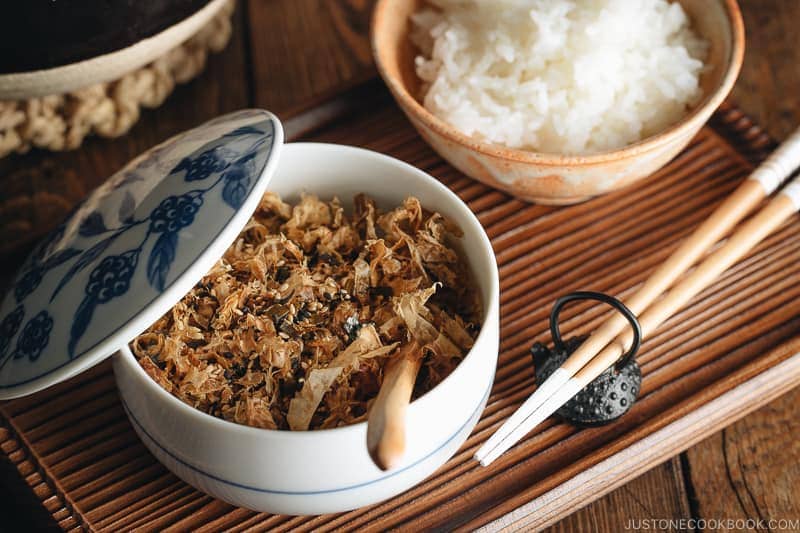
Homemade furikake is rice seasoning made with leftover kombu and katsuobushi from making dashi. This quintessential Japanese rice seasoning is fabulous on rice of course, but also on onigiri, udon noodles, soup, salad, boiled egg, popcorn, and more!
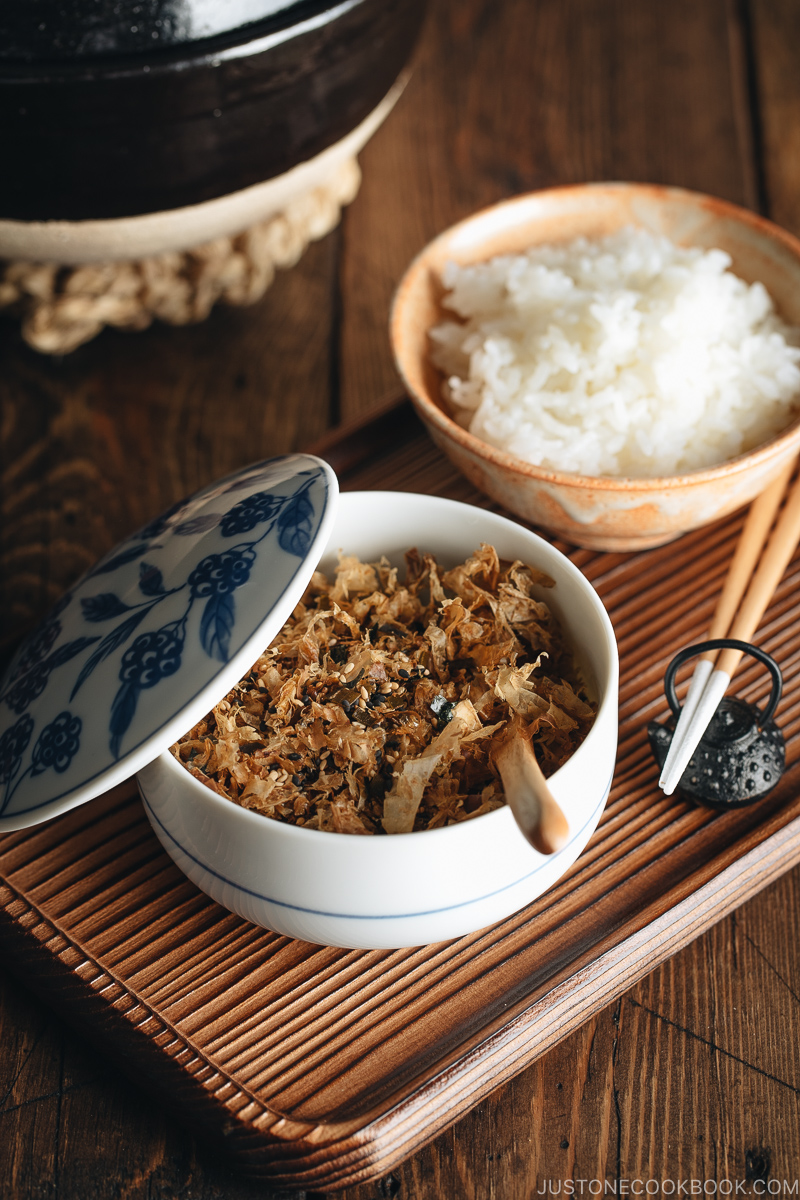
Furikake (ふりかけ) is a nutty, crunchy, umami-packed Japanese blend used to season rice. Although it’s referred to as a rice seasoning, furikake is literally the salt and pepper of the Japanese kitchen. It is so versatile that you can use the seasoning to instantly perk up any bland dishes.
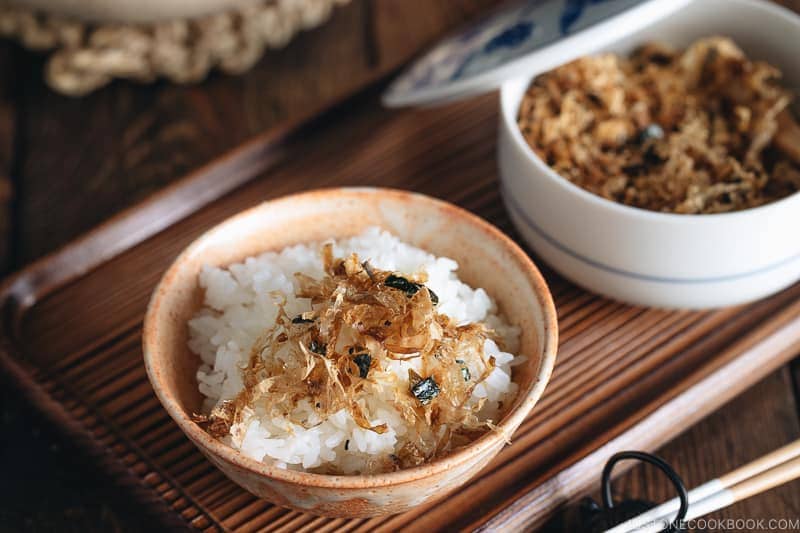
How to Make Homemade Furikake
There are endless versions of furikake, but my homemade version uses leftover kombu (kelp) and katsuobushi (dried bonito flakes). Instead of throwing the kombu and katsuobushi away after making dashi or Mentsuyu (soup base for noodles), this recipe repurposes the ingredients into a delicious seasoning! Not only it adds flavors to plain steamed rice, but furikake can also transform any food you sprinkle on into something more yummy and fun.
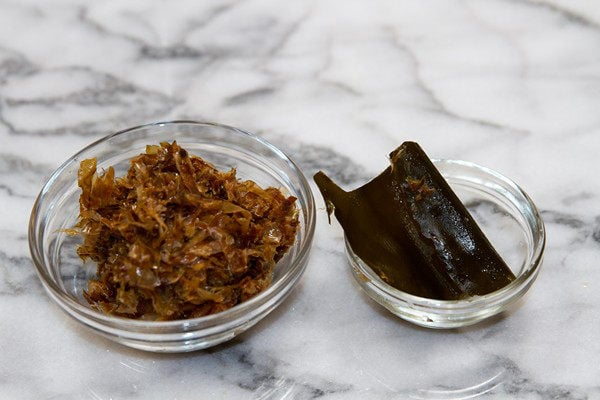
This homemade furikake is really easy to make. You just chop up the leftover kombu into small pieces, combine with katsuobushi, and then cook it in a saucepan. Once the katsuobushi separates, add them in a simple mix of sugar, salt and soy sauce. Cook until the liquid evaporates and the flavor is absorbed, let cool, and then sprinkle in sesame seeds and nori seaweed.
Rich in calcium, iodine, and iron, this homemade furikake is a healthy way to season your Japanese dishes!
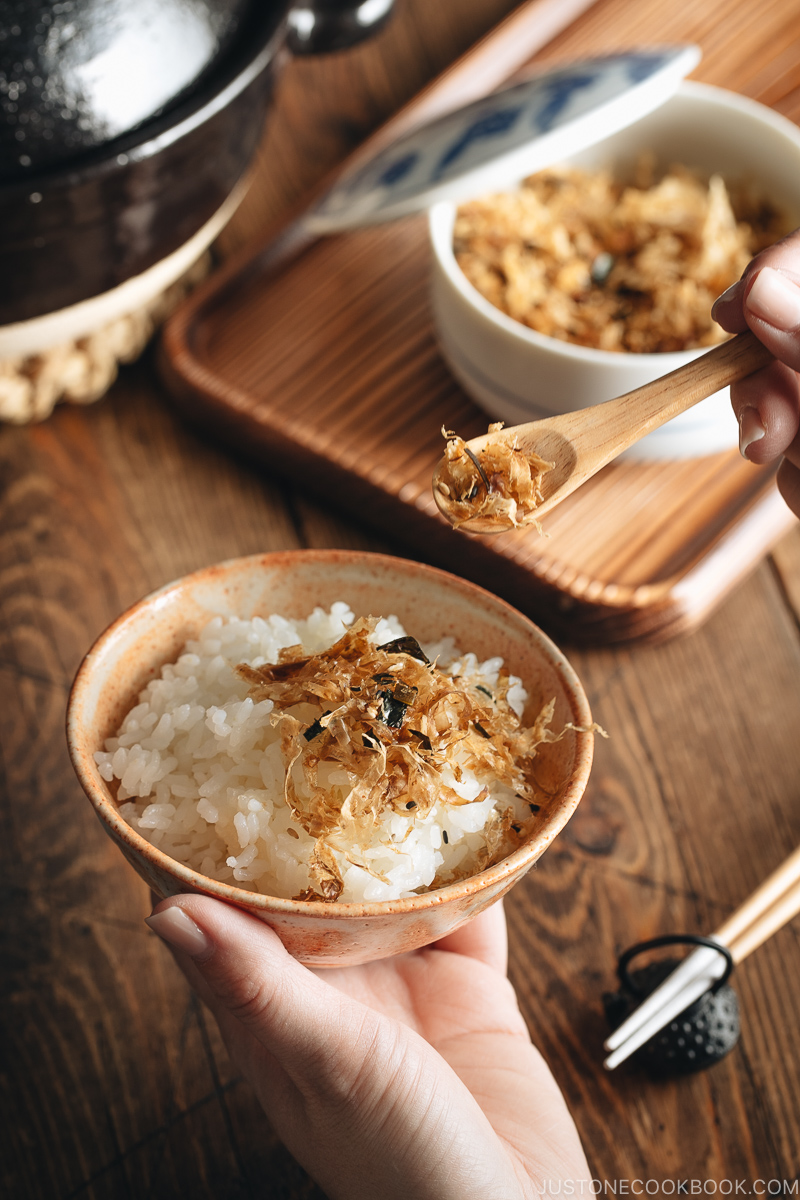
Creative Ways to Enjoy Homemade Furikake
Furikake is absolutely wonderful on just a simple bowl of rice, porridge, or udon noodles. It’s also perfect for seasoning onigiri (Japanese rice balls), soba noodle salad, grilled salmon, or rice crackers. But don’t stop there, furikake is so versatile that I love to get creative and sprinkle it on these as well:
- Avocado – this is my favorite. Keep it simple and halve the avocado and season it with furikake as an afternoon snack. For a savory breakfast, smear your toasted bread with mashed avocado before you give it a good sprinkle of furikake. It’s a Japanese-twist on avocado toast.
- Egg – you can totally replace salt and pepper with furikake on a fried egg or soft-boiled egg when you want something more punchy.
- Popcorn – planning on binge-watching Japanese shows on Netflix or a Japanese movie night? Flavor your homemade popcorn with furikake to keep to the theme.
- Pasta – oh yes, you can top furikake on Mentaiko Pasta, cacio e pepe pasta, or any simple creamy pasta.
So next time, don’t toss the kombu and bonito after making dashi, and instead, create some homemade furikake seasoning and sprinkle it in your favorite dishes. If you make a big batch, you can even freeze the seasoning for a month. Furikake also makes a great holiday gift. Just pack the Japanese seasoning in a cute little glass jar to surprise your foodie friends and family!

Similar Recipes:
Japanese Ingredient Substitution: If you want to look for substitutes for Japanese condiments and ingredients, click here.
Sign up for the free Just One Cookbook newsletter delivered to your inbox! And stay in touch with me on Facebook, Pinterest, YouTube, and Instagram for all the latest updates.
Homemade Furikake (Japanese Rice Seasoning)

Homemade furikake rice seasoning made with kombu and katsuobushi. This quintessential Japanese rice seasoning is fabulous on rice of course, but also on onigiri, udon noodles, soup, salad, popcorn and more.
- ¼ oz reserved kombu ((from making dashi or mentsuyu) (8 g; See Notes))
- 1 oz reserved katsuobushi ((from making dashi or mentsuyu; slightly wet)(30 g; See Notes))
- 1 Tbsp white sesame seeds (roasted/toasted)
- 2 tsp black sesame seeds (roasted/toasted)
- nori seaweed ((I like seasoned nori (Ajitsuke Nori) or Korean seaweed))
Seasonings:
- 1 tsp sugar ((add more to your taste))
- 2 tsp soy sauce ((See Notes))
- ¼ tsp salt (kosher or sea salt; use half if using table salt) ((add more to your taste))
-
Gather all the ingredients. Make sure the kombu and katsuobushi are well drained.
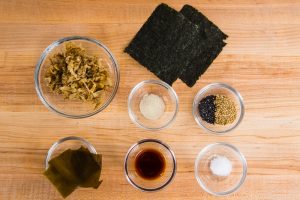
- Cut kombu into small pieces.
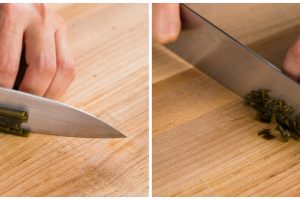
-
Put kombu and katsuobushi in a saucepan and cook on medium-low heat until katsuobushi becomes dry and separated from each other.
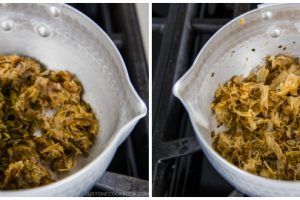
-
Add sugar, salt, and soy sauce.
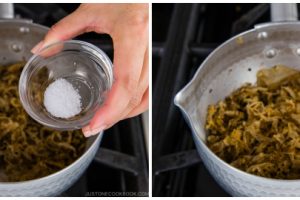
-
Cook on medium-low heat until the liquid is completely evaporated.
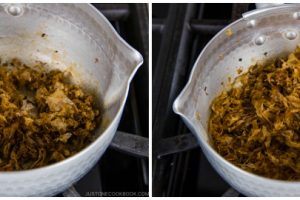
-
Transfer the furikake to a tray or plate and let cool. Once it’s cooled, you can add toasted/roasted sesame seeds and nori seaweed. You can break katsuobushi into smaller pieces if you prefer.
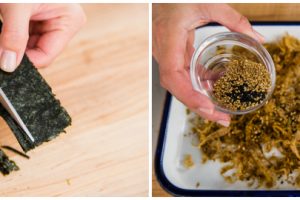
-
Put in a mason jar or airtight container and enjoy sprinkling over steamed rice and popcorn! You can refrigerate for up to 2 weeks and freeze for up to a month.
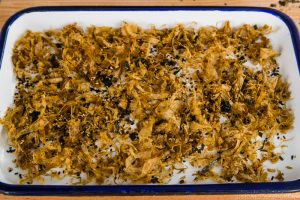
Reserved kombu and katsuobushi:
- Homemade dashi recipe, click here.
- Homemade mentsuyu recipe, click here.
You can store in an air-tight container in the refrigerator for a week or freeze up to a month.
Kombu and Katsuobushi: Don’t worry too much about exact measurement for this recipe. If you have more kombu and katsuobushi you want to use, simply adjust the seasoning according to your taste.
Soy Sauce: You can skip adding soy sauce if you use kombu and katsuobushi from making Mentsuyu (noodle base soup).
Recipe by Namiko Chen of Just One Cookbook. All images and content on this site are copyright protected. Please do not use my images without my permission. If you’d like to share this recipe on your site, please re-write the recipe in your own words and link to this post as the original source. Thank you.
Editor’s Note: This post was originally published in July 2013. The images and recipe have been updated in April 2019.
from Merah Hati Cintaku http://bit.ly/2XkKAZo
via merahhaticintaku.blogspot.my
No comments:
Post a Comment